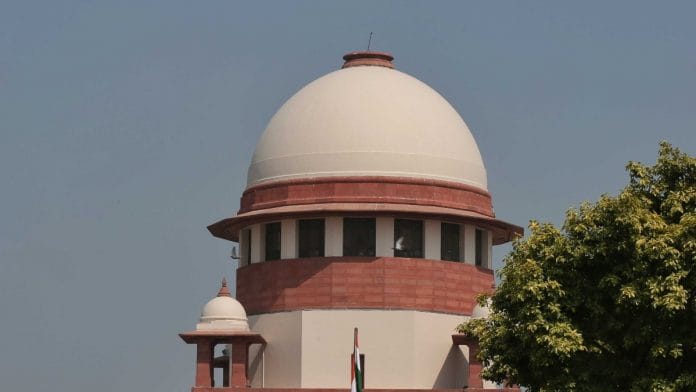New Delhi: It is the corrupt who are destroying the country, remarked the Supreme Court Wednesday during the hearing of a plea filed by activist Gautam Navlakha, an accused in the Bhima Koregaon violence case, seeking transfer to house arrest on medical grounds.
A bench, led by Justice K. M. Joseph, made the observation when the counsel for National Investigation Agency (NIA), Additional Solicitor General S. V. Raju, opposed its suggestion to let Navlakha stay under house arrest subject to strict conditions, saying people like him were a threat to national security and “want to destroy the country”.
The court remained unconvinced and adjourned the hearing to Thursday, while asking Raju to come back with the conditions that could be placed on Navlakha when he is under house arrest.
“You know who is destroying the country, people who are corrupt. Every office you go into or outwards, there is corruption. Who takes action against the corrupt? Nobody,” Justice Joseph retorted.
“We saw a video where people were talking of crores of rupees to buy our so-called elected representatives. Are you saying that they are not destroying the country? They go on merrily and get away with it,” the judge said, when Raju contended that the investigating agencies were acting and filing cases in corruption matters.
“Consider his age. It is not as if he is in the best of his health,” the bench told Raju, when he argued that Navlakha, 70, suffered from medical ailments that were very common for someone of his age.
His medical situation was such that it can be treated by the hospital of the Taloja jail where he is confined, the additional solicitor general said.
“It’s [health] manageable, if you control your diet. It is not something that you require house arrest. We will provide a mattress and cot and everything. We will allow him to get home-cooked food,” Raju said in a bid to convince the judges to let Navlakha remain in the jail.
Navlakha has been in custody ever since his arrest in the Bhima Koregaon violence case in 2018 and is charged under the anti-terror law — the Unlawful Activities Prevention Act (UAPA) — for his alleged association with the banned CPI (Maoist). He moved the top court after the Bombay High Court rejected his plea to be shifted to his sister’s house.
The septuagenarian has claimed that he is suffering from serious ailments, including skin allergy and dental issues, and needed to undergo colonoscopy to test for suspected cancer.
Also Read: Do we run to courts for basic human rights? asks Navlakha’s partner, says he’s not allowed to call
‘What’s the nature of evidence against Navlakha’
Refuting Navlakha’s submissions, the NIA, in an affidavit filed before the SC, claimed that the accused received adequate medical attention from the jail authorities, as and when a direction was given by the courts. “It is clear from the record that the ailments can be managed in the jail hospital.”
Moreover, the NIA said if Navlakha’s custody is modified to that of house arrest, his activities would be difficult to monitor for the prisons authorities as he is in the habit of sending and receiving correspondence from the CPI (Maoist) through electronic media. This, the NIA said, will jeopardise the case of the prosecution and have an impact on the witnesses and others and will tamper with evidence.
However, NIA’s stand was not appreciated by the bench, which sought to know from the law officer about the nature of the evidence against Navlakha.
Raju referred to documentary records with the US investigating agencies to claim that Navlakha had met a general from Pakistan for “his recruitment” in Pakistan’s intelligence agency Inter-Services Intelligence (ISI). This record was part of the investigation undertaken by the US agencies in the case of Ghulam Nabi Fai who faced prosecution for allegedly accepting funds from the ISI, without reporting to American authorities, as per the local law there.
Wondering if this kind of evidence would stand the scrutiny of Indian courts, the bench pointed out that the documents relied upon by the NIA were that of the US administration, not the courts.
“He is a 70-year-old man, and we don’t know for how long the man will live. We are careful and conscious that we cannot risk the country’s security. Therefore, we would put whatever restrictions you want us to put,” the bench said.
The bench also expressed its concern over the delay in progress of trial in the case in which the charge sheet was filed way back in October 2020.
Raju held the arrested persons in the case responsible for the delay, saying that the accused filed multiple applications to delay the hearing.
At present, the additional solicitor general added,16 discharge applications were pending before the special NIA court in Mumbai where the case is pending. “They [the accused] know that they won’t get bail on merit, so, they move for bail on medical grounds.”
(Edited by Geethalakshmi Ramanathan)
Also Read: Words like ‘achhe din’ used at Elgar Parishad to stoke hate: What HC said in Jagtap bail denial






